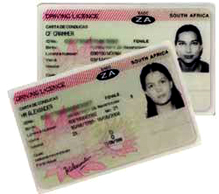|
Getting your Trinity Audio player ready...
|
 Mummy Mangoale approached Boiteko Driving Institute in Pretoria in August 2011, asking about the cost of driving lessons. She met Calvin Theledi, who told her that it would cost her R4 500 to get a Code 8 driving licence. Eager to get started with her lessons, Mangoale arranged to pay the fee in two separate instalments of R2 500 and R2 000. She received a receipt with no letterhead or stamp for the first payment and nothing for the last payment.
Mummy Mangoale approached Boiteko Driving Institute in Pretoria in August 2011, asking about the cost of driving lessons. She met Calvin Theledi, who told her that it would cost her R4 500 to get a Code 8 driving licence. Eager to get started with her lessons, Mangoale arranged to pay the fee in two separate instalments of R2 500 and R2 000. She received a receipt with no letterhead or stamp for the first payment and nothing for the last payment.
It has been over a year since Mangoale paid Boiteko Driving Institute, and she has yet to have a single driving lesson. When it was clear that the school wasn’t going to honour the agreement, she was forced to take the matter to the small claims court to try to retrieve her money. The court ordered the driving school to refund Mangoale, but she has not been reimbursed.
Mangoale’s story is all too familiar – it appears that many desperate South Africans across the country are defrauded by corrupt and illegal driving schools daily.
She has reached out to the Southern African Institute of Driving Instructors (Saidi), an organisation that has fought tirelessly to regulate the industry for 36 years, for help in solving the matter.
The organisation has been unable to retrieve the money back from the driving school.
When Corruption Watch spoke to Calvin Theledi to find out why he had defied the court order, he told the organisation he had never heard of the complainant before and that he never received a letter from court.
However, when Corruption Watch told him it was in possession of such a court order, he said he would repay the complainant.
“I’m willing to pay her back, but I can only pay it in instalments because I’m unemployed,” said Theledi.
Corruption Watch learnt that he no longer works at the driving school, which is owned by his brother Phineas Theledi.
Two weeks ago Saidi president Pat Allen appeared on Y-FM alongside Corruption Watch in its drive to create public awareness around corruption and its “No more tjo-tjo” campaign.
During the show, Saidi revealed that it had received hundreds of complaints of corruption within in the driving instructor industry in the past three years.
According to the organisation, the majority of driving instructors operate illegally countrywide.
In general, most are without certificates to prove that they were registered, according to Allen.
Although it is impossible to get accurate figures, the organisation did a survey in Vereeniging where 22 instructors were confronted, but only four were found to be legal instructors.
Referring to Mangoale’s case, Allen said: “Accepting money for a course of driving lessons, but not giving the customer what they paid for, is theft.
“Applicants are not able to take recourse anywhere. The police tear the statement up, saying it is a civil case. They advise applicants to go to the small claims court.” She indicated that Boiteko Driving Institute was a former member of Saidi, and that her efforts to retrieve the money on behalf of the complainant had been unsuccessful.
Buying a licence
According to Allen, corrupt activities in the industry included fraud, bribery and paying examiners to pass applicants. But the most common action was for illegal driving instructors to run off with the customers’ money without giving them the services for which they paid.
There have also been reports of people who misrepresent themselves as qualified driving instructors and who then use outdated, stolen test sheets to train applicants; and underhanded ways of booking test appointments. Some testers have been accused of overlooking fail points for applicants who have paid bribes, while failing others who operate honestly.
Allen said that it was a crime for driving instructors to socialise with examining officers at driving licence test centres during the pupil’s test, a crime committed by the instructor and the officer. Some illegal instructors disobeyed basic traffic signs and rules of the road, setting a bad example to their students. They openly talked on cellphones, texted while they were driving and didn’t wear seat belts.
“It is the wrong attitude towards the law and it puts additional bad drivers on South African roads,” Allen said. Sometimes instructors went so far as to encourage applicants to drink alcohol, and engaged in sexual activities with students. As a result, some young women wore revealing outfits to entice instructors and examiners so that they could pass their tests.
In addition, some instructors start lessons for new drivers in the heart of city traffic, causing long-term fear of driving, Corruption Watch has heard. More worryingly, some driving instructors don’t use roadworthy vehicles, putting the lives of learners and others at risk.
Lack of regulation
Allen said that corruption in the driving school industry was a growing problem across the country as there was very little effort to enforce legislation and regulate the industry.
Her organisation had tried its best to regulate the industry, but without government support, it had become impossible. “We need government back-up to make it compulsory for every registered instructor to belong to one of the approved associations,” said Allen. “Criteria need to be set for associations. We should be given some authority to regulate our industry ourselves too. We will not accept unregistered instructors.”
Saidi encourages all instructors to operate within the code of conduct and to become taxpayers with a sound financial programme. Learners’ licence training material is free of charge through the organisation, so that instructors are not tempted to use stolen test sheets.
In 2006, it wrote to the office of Thabo Mbeki, the president at the time, about the shortage of driving licence appointments in Gauteng. It was referred to the minister of transport, but the problem has not yet been addressed.
“This lack of driving licence appointments is a direct link to corruption – it is almost certainly a direct cause of much of the situation,” explained Allen. “Members of the public are determined to pass their licences to obtain employment. They cannot get appointments for four to nine months. They then just pay and get it over and done with. Their need is too desperate to wait.”
Use eNaTis
Saidi is calling for the use of the electronic National Transport Information System, or eNaTis, which will enable people to book online at any Checkers shop instead of standing in long queues at driving licence test centres. When an appointment becomes available, an applicant could be notified by SMS.
Despite repeated attempts to regulate the industry, including petitioning the national Department of Transport and provincial departments, Saidi is yet to receive support from the government. “We are compelled by the government to sit at conference tables with leaders of the illegal driving school owners and treat them on [an] equal footing,” said Allen.
Saidi encourages members of the public who come across corruption in the driving school industry to report it to the organisation.
Pat Allen can be reached at 012 998 3910 or pat@saidinational.org.







